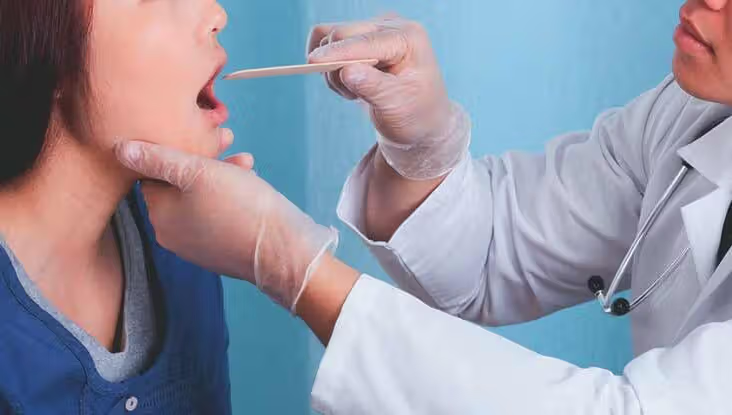
Woman holding her jaw for a toothache concept
Table of Contents
Best Swelling of the Roof of the Mouth: When to Get Assistance
Experiencing swelling on the roof of your mouth can be unsettling. While many cases are benign and resolve on their own, it’s essential to understand when this symptom may require medical attention. This article delves into the potential causes of this condition, signs that warrant a healthcare provider’s evaluation, and appropriate treatment options.
Knowing the Anatomy and Function of the Palate
The upper part of the mouth, or the palate, consists of two parts: the hard palate at the front and the soft palate at the back. This structure plays many functions, which are helping in speaking, swallowing, and keeping the oral and nasal cavities separated. Swelling in this part can occur due to many reasons, each with unique features and consequences.
Common Reasons for Swelling of the Roof of the Mouth
Trauma or Injury
Inadvertent bites, hot food or liquid burns, or trauma by sharp foods can harm the sensitive palate tissues, causing swelling and pain.
Infections
Bacterial or viral infections may result in inflammation of the mouth. Infections such as canker sores or cold sores can manifest as swelling on the palate.
Allergic Reactions
Exposure to allergens like specific foods, drugs, or environmental conditions may cause an immune reaction, leading to palatal swelling.
Dehydration
Insufficient intake of fluids may result in dry mouth and increased sensitivity of tissues to irritation and swelling.
Oral Conditions
Mucoceles, or cystic swellings containing mucus, may occur on the hard palate following minor trauma.
When to Seek Medical Attention
Though minor swelling may resolve with self-treatment, some indicators require professional attention:
- Prolonged or Increasing Symptoms: Swelling fails to get better or becomes worse over a period of time.
- Severe Pain: Acute pain interfering with normal living activities.
- Swallowing or Breathing Difficulty: Inhibited swallowing or breathing capability can be an indicator of a more critical underlying condition.
- Infection Signs: The presence of fever, pus, or redness spreading.
- Duration: Symptoms for longer than a week without resolution.
Diagnostic Approach
A physician will usually conduct a physical examination and can ask questions about activities in the last week, eating habits, and exposures to suspected allergens or irritants. Additional testing in the form of throat cultures, blood work, or imaging will, in some instances, be required to establish the cause.

Treatment Options
Treatment depends on the cause that is found:
- For Infections: Antiviral or antibiotic drugs can be used.
- For Allergic Reactions: Antihistamines or corticosteroids can reduce swelling.
- For Trauma: Painkillers and saltwater mouthwashes can ease pain.
- For Dehydration: Increased fluid consumption and the use of a humidifier can help in recovery.
Preventive Measures
To reduce the risk of getting swelling of the roof of the mouth:
- Practice Good Oral Hygiene: Brushing and flossing regularly can avert infections.
- Stay Hydrated: Proper intake of water keeps the oral tissues moist and healthy.
- Avoid Known Allergens: Knowing and avoiding allergens can avert allergic responses.
- Be Careful with Hot Foods: Waiting for hot foods and drinks to cool first before intake can help avoid burns.
Swelling of the Roof of the Mouth: When to Seek Help
Swelling of the roof of the mouth may be slightly bothersome or medically serious. For those who live in large American cities and have easy access to healthcare, identifying when to visit a professional is essential. Whether stuck in Los Angeles traffic or in a New York skyscraper, this symptom should not go unnoticed when it persists.
What Does Swelling of the Roof of the Mouth Indicate?
The Swelling of the roof of the mouth, made up of both soft and hard tissue, is key to your capacity to speak, swallow, and breathe. When that region swells, the swelling can indicate as little as fleeting irritation or as much as infections or reactions. Knowing what may cause the roof of the mouth to swell will assist in determining treatment.
How Local Irritation Can Result in Swelling
Burns from ingesting hot pizza, coffee, or soup are usual offenders for swelling of the top of the mouth. In large city centers where fast food outlets and takeaway restaurants are common, munchies can result in inadvertent injury. Mucosal tissue is vulnerable, and even slight thermal trauma can cause localized swelling lasting for days.
The Role of Infections in Oral Swelling
Viral infections like herpes simplex or bacterial infections like streptococcus infection can cause inflammation and lesions within the oral cavity. It may begin as just slight swelling of the top of the mouth but can become serious if not treated. Most U.S. urban area dental and walk-in clinics see increases in such oral infections during cold and flu season, so timing is also an indicator.
Allergic Reactions and Immune System Triggers
In big U.S. cities, exposure to a broad variety of allergens—everything from pollen to food preservatives—is just part of life. Swelling of the palate as a localized allergic reaction might affect some individuals. This might happen in mere minutes after eating nuts, shellfish, or even certain drugs, so it’s crucial to pay attention to symptoms and get emergency treatment if breathing is labored.
Dehydration and Environmental Influences
High sodium intakes, pollution, and air conditioning that are prevalent in urban settings might be responsible for inducing oral dehydration. Dryness of the mouth usually causes elevated friction and irritation on the top of the palate. As hydration falls markedly, the soft tissue of the mouth on the top becomes vulnerable to swelling and inflammation.
When Does Swelling of the Roof of the Mouth Become Serious?
Inflammation of the mouth roof cannot be disregarded when it lasts longer than a few days, is accompanied by pain that is sharp, or when it affects speech and swallowing. Environmental factors in places such as Miami or Dallas where heat and allergens are common may enhance the problem. Swelling might also be indicative of systemic diseases such as sinus infection, dental abscess, or even prodromal signs of autoimmune diseases.
Diagnostic Clarity Provided by Medical Experts
In U.S. metropolitan areas with a well-developed healthcare setup, patients suffering from unexplained or persistent swelling of the top of the mouth can see ENT specialists and oral care professionals. A clinical examination, if accompanied by imaging or laboratory procedures, can exclude a hidden infection, cyst, or cancer. Early diagnosis is particularly vital in vulnerable groups such as older adults, smokers, and immunocompromised individuals.
Treating Swelling by Targeted Treatment
After the swelling of the roof of the mouth is caused, proper treatment can be adopted. If the swelling due to infection, antibiotics or antivirals can be prescribed. In cases of an allergic reaction, steroids or antihistamines can be taken to cure swelling. In major cities where urgent dental care is provided round the clock, early treatment can avoid worse complications.
Oral Hygiene and Lifestyle in Prevention of Swelling
Living in highly populated American cities tends to expose one to environmental and food triggers that may not be readily available in rural settings. Practicing good oral hygiene, proper hydration, and careful watch over food temperatures will serve to prevent swelling of the palate. Abstaining from tobacco and restriction of sugar is equally important to preventing oral inflammation.
When to Contact a Healthcare Provider Near You
If you’re unsure whether your condition requires medical help, err on the side of caution. In large cities like San Francisco, Chicago, or Philadelphia, telehealth options make it easier than ever to get professional advice without leaving your home. Symptoms like fever, difficulty swallowing, or swelling that spreads beyond the palate should prompt immediate consultation.
Nationwide Access to Care for Mouth-Related Swelling
Coast to coast, Swelling of the roof of the mouth swelling is an issue confronted in general medicine as well as in dentistry. Centers nationwide, including Mayo Clinic and Cleveland Clinic, provide sound information and specialty treatment. Patients should be encouraged to utilize these resources when making a determination as to whether or not to wait or act.
Inflammation Swelling of the roof of the mouth can be caused by a number of factors, from mild injury to more serious illnesses. Most cases can be treated with mere home care, but it’s important to learn when medical treatment is required. If you have continued or severe symptoms, seek out a healthcare professional for proper diagnosis and care.
For further information on oral health and associated conditions, look up credible sites such as Verywell Health and Cleveland Clinic.
Inflammation of the mouth’s roof can appear to be slight initially, but it can be indicative of underlying health issues. An understanding of when to seek help is important, particularly in urban areas where lifestyle, pollution, and stress can exacerbate oral issues. By remaining vigilant for the symptoms and responding promptly when necessary, patients can provide assurance that their health is in check and that small irritations do not escalate into major issues.
For updates and patient information, visit Healthline or WebMD to learn more about oral health and available treatments in your community.
FAQ:-
Investigating Roof of Mouth Swelling Symptoms
It is unsettling to have roof of mouth swelling. Roof of mouth swelling can be caused by a wide range of factors, such as infections, trauma, burns, or allergic reactions. Painless, redness, difficulty eating, and swallowing difficulty are some common symptoms of roof of mouth swelling. Roof of mouth swelling can be caused by infections like sinusitis or oral thrush. Moreover, eating hot foods can lead to heat burns, which cause localized swelling. In other situations, allergic reactions might involve acute roof of mouth swelling, with itching or difficulty breathing. Roof of mouth swelling that persists or is severe should be medically attended to eliminate underlying causes and have proper treatment.
How to Identify Swelling in the Roof of Your Mouth
Identifying swelling in the roof of your mouth begins with the awareness of pain, discomfort, or texture changes. The region can be tender or red in color. Swallowing or drinking will be uncomfortable. Swelling is caused by infections, burns, or allergies. If the swelling in the roof of your mouth is persistent, see a health professional.
Identifying and Treating Roof of Mouth Swelling
Roof of mouth swelling can occur due to many reasons, such as infection, burns, trauma, or allergic reaction. The detection of roof of mouth swelling includes noticing symptoms such as tenderness, redness, or pain upon eating or drinking. If neglected, roof of mouth swelling can progress further or indicate an underlying condition. Getting timely medical attention for roof of mouth swelling ensures effective diagnosis, alleviation, and prevention of more complications.
The Effect of Oral Health on Roof of Mouth Swelling
Proper oral hygiene is important in avoiding roof of mouth swelling. Foul mouth, gum disease, or abscesses are poor oral health indicators that could cause roof of mouth swelling. Brushing the teeth regularly, flossing daily, and visiting the dentist regularly avoid irritation and inflammation. If swelling of the roof of the mouth occurs, it could be a sign of improving oral care or treatment. Good oral health prevents roof of mouth swelling from recurring.
Effective Swelling Treatments for Roof of the Mouth
Swelling of the roof of the mouth can be painful and inconvenient. Infection, burn, or allergic reactions are common causes of swelling in the roof of the mouth. Depending on the cause of swelling in the roof of the mouth, effective swelling treatments vary. Mild swelling in the roof of the mouth can be relieved by saltwater rinses and cold compresses, but severe swelling may need antibiotics or antifungal drugs. Having good oral hygiene also prevents the recurrence of swelling of the roof of the mouth. If symptoms do not improve or worsen, seek medical help.







